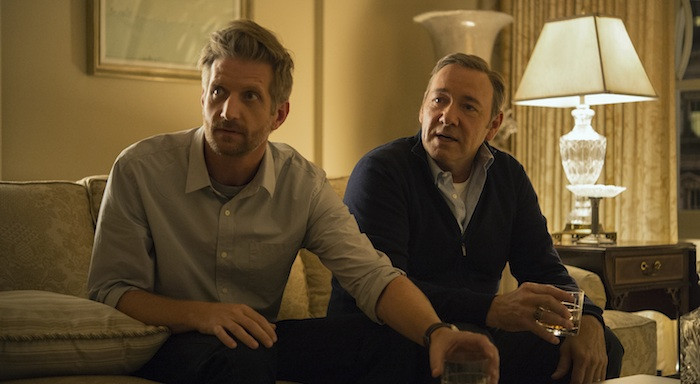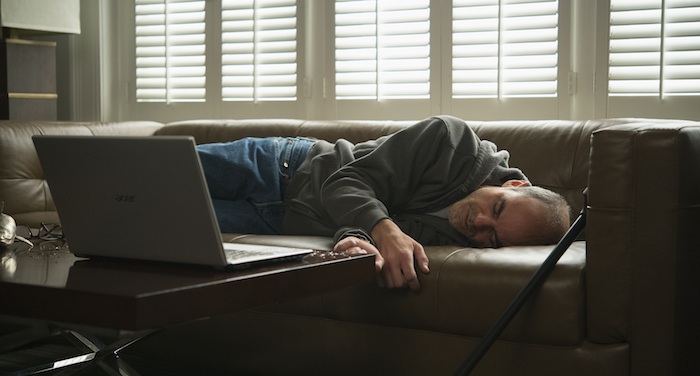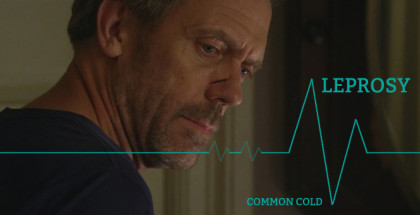Netflix UK TV review: House of Cards Season 3 (Episode 8, 9 and 10)
Review Overview
Faith
9Politics
8Love
10Chris Bryant | On 05, Mar 2015
Warning: If you have not seen House of Cards Season 3 Episodes 1 to 7, this will contain spoilers.
“A hurricane has been forming, not for weeks, but for decades. Its name is not Faith: it’s Francis.”
Chapters 34, 35 and 36 are integral to the evolution of the series this season. They define the tone and message as an uphill struggle for Francis, with a knock-on effect of causing mistrust and chaos for those around him and providing ample ammunition for his opposition. Flagging on all fronts, even his lesser tasks produce trouble, all while he’s positioning himself for the Presidential race in 2016.
The obstacles begin with Hurricane Faith. The Bill Kennedy-penned Chapter 34 revolves around America Works, as funding is pulled by a Congressional bill Frank is forced to sign to prepare aid for when the hurricane hits the East coast. Where Underwood has previously relished a chance for a good fight, here he is bound by the laws of man and nature.
“It’s out of my hands, I can’t control the weather,” he says. Weak words from a man who’s literally spat in the face of God. Then again, as the hurricane turns and heads away, having only destroyed Frank’s best chance at an elected Presidency, it seems that God is aware of Frank’s insult. Underwood locates a second wind in his treatment of Freddy (a still husky and wise Reg E Cathey), finding him a suitable job outdoors at the White House.
On other stormy fronts, Underwood is challenged once more by distaste-merchant Petrov. As Claire attempts to sooth the concerns diplomatically in the Jordan Valley, engaging in progressive talks with Israel, Palestine (including the demands of Hamas and Hezbollah) and, of course, Russia, she is faced with threats to more than election chances. Informed that an IED explosion may have been orchestrated by the FSB (Russian Secret Service), she demands action from her husband. In a heated, haunting scene, Spacey and Wright outdo themselves as Francis outright calls Claire a failure he has no faith in, and sets out to meet the begrudgingly admirable Petrov. Frank and Claire’s discussion is a pivotal scene, a credit to director Agnieszka Hollad as much as the titanic performances displayed. The audience have seen Underwood fail before, but seeing him so distant from his wife is more troubling than any crisis or natural disaster the show could offer.
Elsewhere in Washington, love is wreaking more havoc than politics. Baldwin and Yates’ respective writings act as narrators for the eighth episode, and as the two pieces become intertwined, so do their authors. Although it’s a dangerous notion, their relationship opens up a way of really meeting the characters, rather than their reputations. Paul Sparks’ writer, in particular, is notable; he, unlike everyone else in the dimly lit drama, doesn’t appear to want anything. He enjoys his job, and talking to Underwood. Later, he recognises Claire’s value to him. Yates is a perceptive black sheep surrounded by wolves; a lone, soulful artist wandering through a building constructed on prestige, lies and ruthlessness.
Frank’s battle cry resonates throughout the series that preceded it: “You are entitled to nothing.” No-one exemplifies this more than Underwood’s own Douglas Stamper. Michael Kelly has a blistering few episodes, when a discovery about Rachel moves him back towards alcoholism. After so many failed attempts to regain Frank’s favour, he finally spins one that works: self-destruction. It lights the fuse on one of the most shocking verbal attacks on the show so far. Deceitful, sacrificial and viciously honest – it’s the Frank Underwood we all know and love.
Following the theme of love – welcomed and inescapable in a season of political duelling – attention is drawn to a story which has had little effect on the major outcomes of the season so far: Remy Danton and Jackie Sharp’s tense back-and-forth. As she acts as a puppet for Frank, she’s often thrown together with Remy to discuss strategy. Their conversation breezes past even the most acutely eared fans, as Ali (Remy) and Molly Parker (Sharp) dazzle and wrench the feelings of all. The romantic tension between them is comparable only to Doug’s infatuation with Rachel; it’s nervous and obvious and brought to life by the momentary glances and fumbled words of the actors. Producing one of the only free and honest conversations on the show, it’s undeniably beautiful and borderline heartbreaking.
As the season edges towards the final few episodes, it’s clear that this is not House of Cards as we’ve seen it before. The larger writing team and the audience’s familiarity has allowed for an exploration of these colossal characters. Giving such flaws to people who so openly detest weakness is risky – and a staggering success. With an audience so emotionally involved, the realisation of what may be to come is almost unfathomable. Presidential candidate Sharp and her new husband express it perfectly in a conversation about their days: “You have to deal with it. You don’t get to walk away.” She agrees: “It’s life or death.”
All 13 episodes of House of Cards Season 3 are available to watch on Netflix UK, as part of an £9.99 monthly subscription.
Photos: David Giesbrecht for Netflix




















